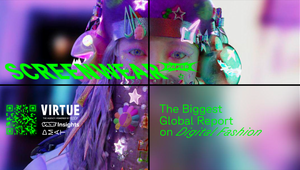
5 Minutes with… Amy Davies

Amy Davies, global VP of foresight at VIRTUE tells us she wishes she had “some master plan straight out of university, but [she’d] be lying.”
The fact is though, that the one thing she knew for certain was that she wanted to work “in media”. “Someone took a chance on me very early on,” she shares. “I worked for one of the world’s first social networks – for the mobile industry – which was also a research consultancy that got me investigating the impact of mobile phone usage on young people.”
From there, Amy embarked on a varied career – from public relations to programming global media events, running an entertainment start-up accelerator, leading brand strategy and creative, to foresight and research. “I used to worry that not staying in one late would be detrimental, but now I think it’s my superpower,” Amy says.
Today, Amy took the learnings and challenges from her many paths and channelled them all into becoming the brains behind all things strategy at VIRTUE. With over 10 years of experience working at the intersection of culture, media and technology, her expertise lies in decoding cultural shifts and helping brands innovate to stay relevant, particularly amongst gen z audiences. Amy’s also been instrumental in launching PIGEON, VIRTUE’s new in-house ‘cultural accelerator’, more on which later.
Amy’s role focuses on understanding and leveraging cultural trends to drive brand innovation, which is much more than a buzz word for VIRTUE. She has produced and pulled together the company’s report ‘VIRTUE’s Guide to Culture’.
LBB’s Zoe Antonov sat down with Amy to find out what makes gen z click, what cultural gusts and breezes shouldn’t be ignored in today’s landscape, and more.
LBB> Tell me a little more about your role as global VP of foresight. What's the most difficult part of working this job on a global scale and what's the most exciting part?
Amy> Of course I spend a lot of time thinking about where culture and society are headed. The toughest part? There’s no crystal ball to hand, no guaranteed view of the future. The world is incredibly diverse – countries, communities, and individuals all operate in their own unique ways, and nothing can be considered monolithic. But that’s also what makes it so exciting. It’s this very complexity that gives us the freedom to be curious, to ask questions of people, and to dive deep into investigation. It’s about embracing the unknown, looking for signals of change, visioning potential future scenarios, and using our curiosity to help anticipate what’s next.
LBB> You specialise in helping brands stay relevant particularly with gen z audiences – what are these audiences saying globally? Are brands able to address them at a global scale?
Amy> Well, feel free to check out our guide to culture about what some of these audiences are doing globally! There are definitely certain commonalities and cultural shifts that are happening on a global level within gen z audiences. However, there will usually be subtle differences with how youth culture shows up by market and regionally.
For example, if you look at our ‘APAC Guide to Culture’, you’ll see the stories and narratives of the female experience and feminism itself will show up slightly differently to say Western markets, where they are finding strength in softness. If I look at the youth data we have on our audiences in EMEA versus America there are a lot of similarities in general attitudes, perceptions, etc., but always subtle differences – the idea of ‘aspiration’ lands slightly differently and this would impact any brand looking to build relevance through this trait. So that’s all to say a brand’s global strategy must strike a balance between landing its global messaging versus capturing local nuance. Cultural context will always matter.
LBB> What are some cultural trends currently in the UK that brands should be aware of and how do you think they'll change in the coming year?
Amy> I'm closely following cultural shifts here in the UK, and of course, AI and upcoming legislation changes are under the microscope for me as a huge disruptor of creativity, empathy, and the role of humanity as it becomes our co-pilot in life, love and work.
Like many, I’m paying close attention to contemporary shifts in masculinity. It’s impossible to ignore some concerning statistics emerging among young men. Independent inquiries into the UK education system have flagged a worrying rise in sexism and misogyny among boys. Among UK males aged 15-24, suicide rates are alarmingly three times higher than their female counterparts and social media algorithms continue to flood teenage boys with misogynistic content. I think many of us will be championing fresh models of healthier masculinity in the year ahead —think more empathy, education, fewer toxic tropes, and a reimagining of what masculinity can represent.
On a lighter note, we’re seeing the continued rise of hyper-regional culture. A few years ago we discussed the trend of 'reclaimed heritage' and young people’s desire to celebrate their roots. Well, it’s continuing to evolve. Hyper-regional fashion microcosms – Scouse swag, Cymru cool, Bradford vibes. Regional accents and styles are badges of honour.
And I just read in The Guardian that nightclubs have been replaced by book clubs for UK’s gen z. I think it’s interesting that various hobbies have been having a ‘glow-up’ for youth. Now, it’s all about book clubs, birding, and pastimes like crochet. I like that hobbies aren’t necessarily about perfecting a craft – they’re about having fun, connection and finding joy in the imperfect. It’s all part of a bigger cultural shift towards low-stakes play, work/life balance, living in the moment, and the simple pleasure of doing things ‘just because’. Whether it’s half-assing a new skill or simply refuelling creativity, it’s clear: a bit of laid-back fun needs to be on the agenda in the year ahead!
LBB> And what do you make of brand trust when it comes to younger audiences? Has this been on a decline, and why? How can brands gain it back?
Amy> Unfortunately, for our youth audiences, trust is under fire across a variety of contexts: in the news, in our leaders and our belief in brands, and especially for gen z, whose bullshit detector is on high alert.
The research team ran a study on trust and what we discovered is that the most successful trust-building companies demonstrate a contribution to the shared fabric of modern culture, the foundational pillars that guide us, unite us and move us forward.
Too often, we hear from brands that approach trust with a campaign mentality or a short-term sustainability initiative, expecting it to resonate with gen z. But here’s the truth: to gen z, those efforts mean nothing if brands aren’t putting in the work. Trust isn’t built in a quarter – it’s earned over time by consistently showing up and making a long-term contribution to the cultural fabric that underpins gen z’s lives.
Trust goes beyond your messaging or the tone of your campaigns. It’s woven into every aspect of your business – from how you source your products to how you treat your employees and customers. Culture doesn’t pause when a campaign ends, and neither should a brand's commitment to it.
LBB> You were also instrumental in launching PIGEON, VIRTUE's in-house cultural accelerator. Tell me about how it works and what gap did it fill for the company.
Amy> Being ‘culturally relevant’ wasn’t a buzzword a few years ago, but it is now, and it’s losing meaning. In our world, being culturally relevant isn’t about jumping on the latest TikTok trend. It’s about something deeper.
That’s why we launched PIGEON – to help our clients understand and qualify their cultural investments and evaluate slow-moving pockets of culture. My brilliant co-founder developed an engine that leverages natural language processing (NLP) and AI to sift through big data, pinpointing the cultural niches and communities where our clients already hold cultural capital. Take a luxury brand, for example. It might be synonymous with haute couture, but our engine could reveal its unexpected influence within let’s say the anime community. Our engine maps out networks within just 2% of separation, creating a systems visualisation of cultural pockets with value.
However, identifying these cultural pockets is just the beginning. The real magic happens when our consultants at PIGEON dig deeper. Using mixed-method research – qualitative, quantitative, and foresight – we dive into these cultural territories to understand human needs and anticipate forces of change. We collaborate with our clients to pinpoint new opportunities and/or to sense-check their current strategies.
Let me just be transparent – our engine is still in beta, and we’re working with clients to model, iterate, and model again. So I'll call out, if there are brands who want to be part of this journey, I’d love to hear from you!
LBB> What do you think should change in the industry as it is currently, and how do you use/want to use your position of influence to help accelerate this change?
Amy> For me, it always circles back to genuinely caring about the people we influence and the society we’re part of. Advertising, media and corporations come with a duty of care, a responsibility we shouldn’t ignore. If I can highlight what truly matters to people–and young people care about a lot and deserve a better future, including my own kids–then I know I’m using my platform in the right way.
LBB> Can you recommend to us some of your current favourites – books, films, TV shows, or whatever you've been loving lately!
Amy> I’m a massive sci-fi and fantasy fan, and I’ve recently rekindled my obsession with season two of ‘The Lord of the Rings’ TV show. It helps that Morfydd Clark – the brilliant actress who plays Galadriel – is Swedish-born and Welsh, which upgraded my fan status as someone proud to be born and bred in Wales.
Books-wise, I’m just about to wrap up ‘Cultural Intelligence for Marketers’ by Anastasia Karlina Gabriel. I think we speak a lot of the same language at VIRTUE, and seeing it laid out in practical ways has been incredibly beneficial. I’m also revisiting Donella Meadows’ ‘Thinking in Systems’ – a needed reminder of the complexity of our world!















